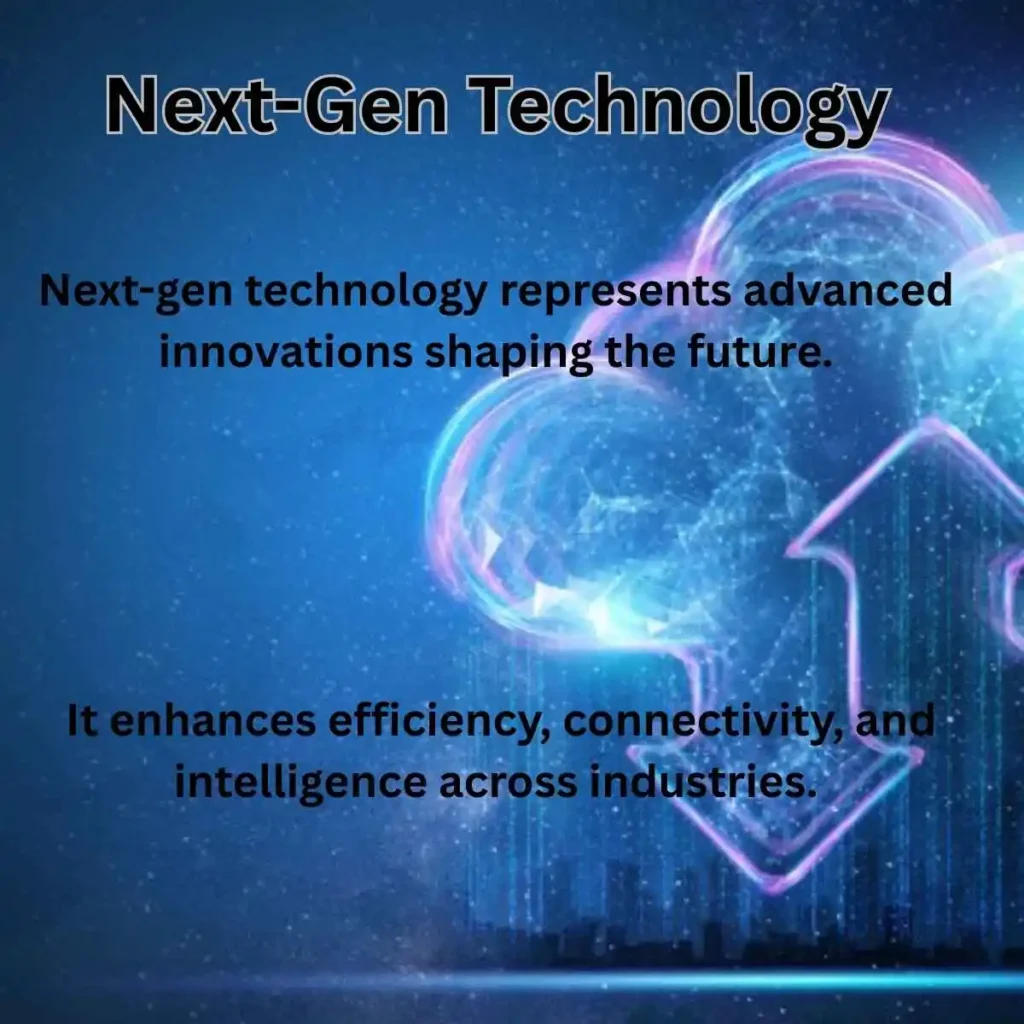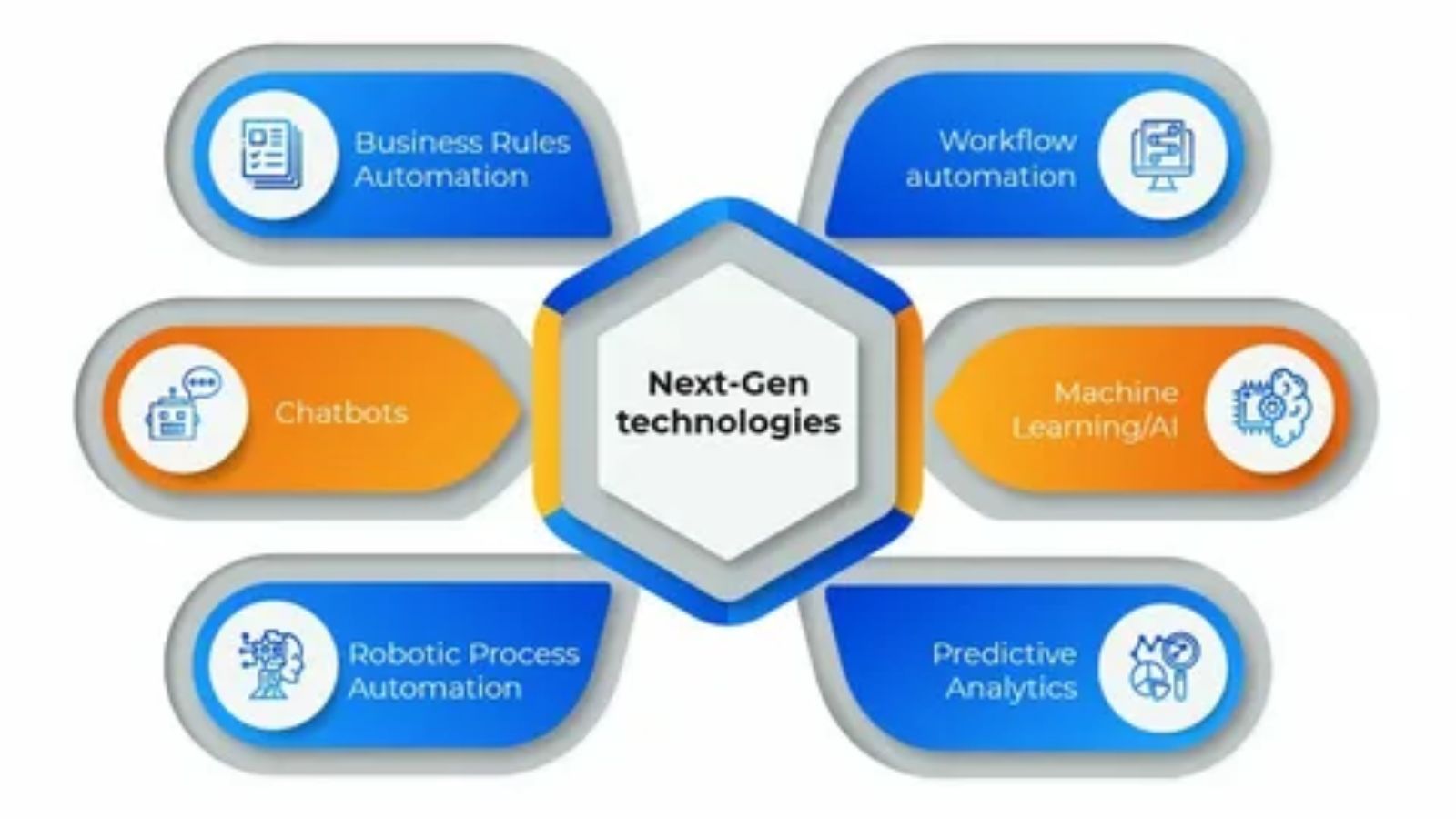Next-Gen Technology is changing how America builds, connects, and scales digital systems. It blends intelligence, speed, and automation into everyday operations. From startups to federal agencies, next-gen technology now drives resilience, growth, and trust across complex environments.
This guide explains what next-gen technology means today. It shows how organizations deploy it at scale. It also explains why leaders like the CIO, CTO, and IT Director rely on disciplined execution, not hype.
What Is Next-Gen Technology?

Next-Gen Technology describes advanced systems that learn, adapt, and scale rapidly.
Specifically, these tools include AI, IoT, cloud, and automation platforms.
As a result, they outperform legacy systems by design.
In other words, think of it as a jet engine replacing a propeller mid-flight.
In the USA, next-gen technology supports Enterprise IT modernization across healthcare, finance, retail, and government. It enables faster decisions and safer networks. It also reduces downtime through automation and analytics.
Core Traits of Next-Gen Technology
Next-gen technology favors speed and intelligence. It thrives on data and automation. For example, AI-driven monitoring predicts failures before users notice. That shift boosts uptime and confidence for teams managing IT infrastructure deployment.
A Technology Project Manager often compares this shift to moving from paper maps to GPS. Both guide you, but one adapts in real time. That difference matters at scale.
Next-Gen Technologies List (Latest & Emerging)
Next-gen technology includes AI, machine learning, IoT, blockchain, edge computing, and advanced cybersecurity.
Individually, each tool solves a different problem; however, together, they form comprehensive next-generation technology solutions for modern enterprises.
As a result, these systems support enterprise technology deployment across thousands of locations.
Furthermore, they enable nationwide IT rollout programs with consistent quality and speed.
Breakthrough Next-Gen Technology Examples
AI personalizes customer journeys, while IoT sensors monitor assets.
Meanwhile, edge computing reduces latency; in parallel, quantum research promises massive leaps.
Together, these tools power large-scale technology rollouts without constant human intervention.
As one U.S. CTO said, “Next-gen technology turns complexity into a competitive edge.”
Automated Testing in Next-Gen Technology

Automated testing ensures reliability at speed. Manual testing cannot keep up. AI-driven tests learn from failures. They fix scripts automatically. This approach supports Standardized deliverables and predictable outcomes.
For Enterprise IT support, automated testing reduces risk during upgrades. It protects uptime during Multi-site technology deployment. It also supports strict Service Level Agreements (SLAs).
AI and Testing at Scale
AI testing tools predict defects early. They reduce Site revisits and wasted effort. That efficiency improves First-visit success during deployments.
Teams achieve On-time execution because systems validate changes before release. This discipline supports a repeatable Rollout methodology.
Industries Using Next-Gen Technology
Healthcare uses AI diagnostics. Finance uses real-time fraud detection. Retail uses predictive demand planning. Transportation uses autonomous systems. Education uses adaptive learning platforms.
Each sector depends on Managed IT services to maintain uptime. They also rely on Field service management to coordinate people and systems.
U.S. Industry Adoption
Manufacturers deploy smart factories. Utilities deploy IoT grids. Media firms deploy immersive platforms. All require Enterprise IT modernization and reliable Managed field services.
A senior IT Director noted, “Technology fails without execution. People make it work.”
Benefits of Next-Gen Technology for Businesses
Next-gen technology improves efficiency and insight. It lowers costs through automation. Now it increases resilience through redundancy and analytics.
It also enables Single point of accountability. That clarity matters during Technology rollout services across many sites.
Challenges and Risks of Next-Gen Technology
Security remains a concern. Skills gaps persist. Legacy systems resist change. These risks demand planning and Lifecycle documentation.
Leaders mitigate risk with training and governance. They also use Remote technical support to reduce Truck rolls and delays.
How U.S. Companies Adopt Next-Gen Technology
Adoption starts with assessment; first, teams plan architecture and timelines.
Next, they execute with precision using a proven deployment engine.
However, success ultimately depends on technician readiness and field workforce coordination; without them, even the best tools fail.
Next-Gen Technology in Georgia & Tbilis
Georgia in the USA has become a deployment hub. It supports ICT deployments and logistics. Tbilis offers skilled talent and cost efficiency.
U.S. firms use these regions for Smart hands services and scalable support. They accelerate Multi-site technology deployment without sacrificing quality.
Next-Gen Technology.io – Company Overview
Next-Gen Technology.io delivers execution, not buzzwords. The company specializes in On-site IT field service and Managed IT services. It supports enterprises nationwide.
Clients rely on Skilled field technicians and Smart hands technicians for complex work. The company ensures Single point of accountability across projects.
What They Deploy
| Capability | Description |
|---|---|
| Structured cabling | Reliable physical network foundations |
| Demarc extensions | Clean handoff points for carriers |
| Wireless access point installation | Secure and scalable Wi-Fi |
| Network upgrades | Faster and safer connectivity |
| IoT device deployment | Smart sensors and endpoints |
| Data center installation | Racks, power, cooling |
| AV infrastructure | Collaboration and media systems |
| Equipment refresh | Modern hardware replacements |
| Inside wire / outside plan | End-to-end connectivity |
This approach reduces Site revisits and improves outcomes.
Future of Next-Gen Technology & Career Growth
The future favors automation and scale. AI and IoT will expand fast. Careers will grow in deployment, security, and analytics.
Roles supporting Enterprise technology deployment will surge. Demand for IT field service technicians will remain strong. Next-gen technology rewards those who adapt.
“The future belongs to builders who execute well,” said a U.S. CIO.
FAQs
What are next-gen technologies?
Next-gen technologies are advanced tools like AI, IoT, cloud computing, and automation that improve speed, intelligence, and efficiency beyond older systems.
What does next generation technology mean?
Next generation technology means newer, smarter systems designed to replace legacy technology and solve modern problems at scale.
Who is the CEO of NexGen Tech?
There is no single, universally recognized company called “NexGen Tech,” so a confirmed CEO cannot be identified publicly.
What will be the next new technology?
The next major technologies are expected to include advanced AI agents, quantum computing, and autonomous systems that require minimal human input.
Does NextGen use AI?
Most companies using next-gen technology rely on AI for automation, analytics, testing, or decision-making.
What are the 5 best emerging technologies?
Artificial intelligence, Internet of Things, edge computing, advanced cybersecurity, and quantum computing lead current innovation.
Who founded NexGen?
There are multiple companies using the NexGen name, and founding details vary by organization and are not universally defined.
How many employees does NexGen have?
Employee counts depend on the specific NexGen company, and no single verified number exists.
Is NextGen a company?
NextGen is both a general technology term and a name used by multiple companies across different industries.
Final Thoughts
Next-gen technology is no longer a future concept; instead, it already shapes how businesses operate, scale, and compete.
Moreover, from AI to automation, these innovations help organizations move faster and smarter.
As adoption continues to grow, therefore, companies that invest early gain greater resilience, improved efficiency, and a long-term competitive advantage.


